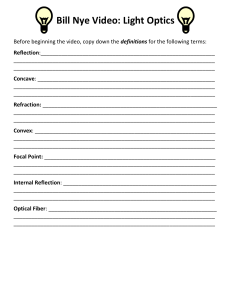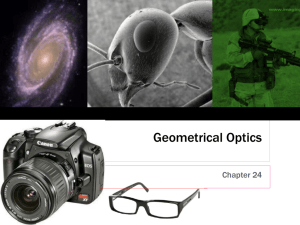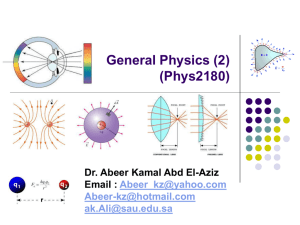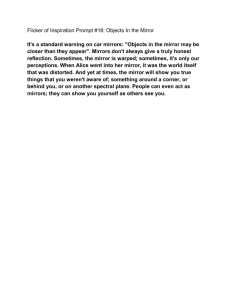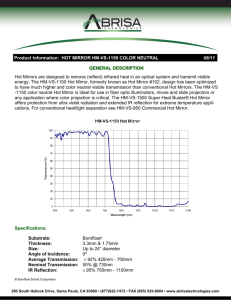Geometrical Optics
advertisement
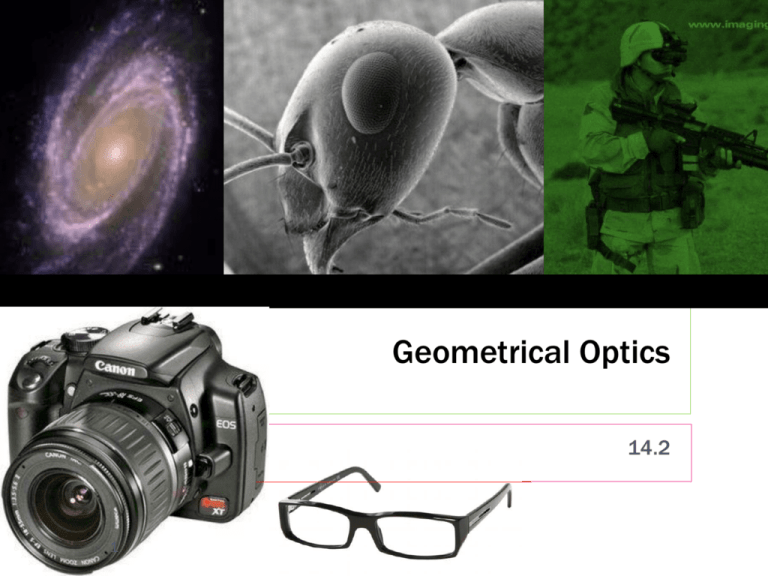
Geometrical Optics 14.2 1 Getting There Fast – Are you studying for the final yet?? Sunday Monday Tuesday Wednesday Thursday Friday Saturday 1 2 3 4 Complete Induction 5 6 AC 7 8 AC Quiz? 9 10 11 COMPLETE AC EXPT 12 13 OPTICS 14 15 OPTICS 16 17 18 EXAM #3 (No Optics) 19 20 OPTICS 21 22 OPTICS 23 24 25 (LAST LASS) OPTICS 26 27 28 29 30 FINAL HPA 119 9:00 AM 2 EM Waves POLARIZATION Quiz This week This week we will cover some topics in geometrical optics. This will include mirrors and lenses. This is about all that we will be able to accomplish. Only what we cover in class will be covered on the final examination. There will be NO QUIZ this week. The final exam will be on Saturday, April 30th in room HPA 119. (Two Index Cards allowed) Entire semesters work. Joint exam with other Studio Class. Watch for new WebAssign and probably one after that. 3 Next Week Monday Post Test (will be used for borderline cases) Complete topics and possibly some problems Wednesday-Friday If there is coordinated interest, I might be able to come to campus and go over some problems. Need to find some common day/time to do this. Saturday 4 Final Examination (2 index cards allowed). About the final examination Only topics discussed will be covered on the final exam. 5 In class, On class PowerPoint lectures Contained in the lab sheets, Included in WebAssigns or Assigned for reading That’s a lot of stuff! Bring ALL Lab Units from Magnetism Through Optics to class on Friday. One of them will be collected for grading. STUDIO UNIT ??? 6 Geometrical Optics Yup … more angle stuff! 7 Geometrical Process Object Image Lens or Mirror 8 Where’s the image, where’s the object … who cares??? We do! Questions about the image: What kind of an image is it? Real Virtual Where is the object, where is the image? Behind the mirror In front of the mirror Where is the light coming from? Where is it going? What is the size of the image? (magnification) What is the orientation of the image? 9 Same as the object, Inverted (upside down) Reverse What kind of optics: Mirror Lens Planar Concave Convex converging diverging Where is the light? 10 Have you seen the light yet? mirrors Note The object is usually the source of light. The image is where the light converges to replicate the object. The image can be on either side of the “optical element” The image can be real or virtual The image can form an object for a second optical element. Yes .. it can be confusing. We will attack this a point at a time. You have done some of this in the units so this is a review of sorts. 11 Signs – We mean (-) or (+) The distance from the object to the lens/mirror is called the object distance. The distance from the image to the lens/mirror is called the image distance. It is positive if it is on the same side of the optical element as the incoming light. Otherwise it is negative It is designated by s It is positive if it is on the same side as the outgoing light It is designated by s’. Otherwise it is negative. Without this sign convention, these problems would be much more difficult. So pay attention to them!! 12 Consider looking in a plane mirror in your bathroom. Your image distance is A. B. C. 13 Positive Negative This convention doesn’t apply to my bathroom mirror. 14 15 Paraxial Rays : Small Angle Approximation theta sin tan 0.01 0.01 0.01 0.02 0.02 0.02 0.03 0.03 0.03 0.04 0.04 0.04 0.05 0.05 0.05 0.06 0.06 0.06 0.07 0.07 0.07 0.08 0.08 0.08 0.09 0.09 0.09 0.10 0.10 0.10 0.11 0.11 0.11 0.12 0.12 0.12 0.13 0.13 0.13 0.14 0.14 0.14 0.15 0.15 0.15 0.16 0.17 0.16 0.17 0.16 0.17 0.18 0.18 0.18 0.19 0.19 0.19 0.20 0.20 0.20 0.20 0.15 0.21 0.21 0.21 0.22 0.22 0.22 0.23 0.23 0.23 0.24 0.24 0.24 0.25 0.25 0.26 0.26 0.26 0.27 0.27 0.27 0.28 0.28 0.28 0.29 0.29 0.29 0.30 0.30 0.30 0.31 16 sin tan sin 0.45 0.40 0.35 0.30 0.25 0.10 0.05 0.00 0.00 0.10 0.20 0.30 0.40 y' m 1 y s s' 17 18 Curved Mirrors For Student Misery Only! 19 Concave Mirror con-CAVE 20 Sign Convention When the Center of Curvature is on the same side of the outgoing ray, R is positive. Otherwise, if the center of curvature is not on the same side as the outgoing ray, R is negative. 21 Concave Mirror/Paraxial Approximation (external angle) 2 h s h s' h h 2 s s' MIRROR EQUATION 22 The normal to the surface passes through C Therefore h R Consequently h h 2h s s' R 1 1 2 s s' R For this structure A. B. C. D. The Radius R is positive and s’ is negative The Radius R is negative and s’ is negative R is positive and s’ is positive R is negative and s’ is positive Answer 23 When the Center of Curvature is on the same side of the outgoing ray, R is positive. the image distance is positive if it is on the same side as the outgoing light 24 This image is A. real, reversed B. virtual, not reversed C. real, not reversed D. virtual, reversed 25 What about here? R, s, s’ 26 (convex mirror) Concept: Focal Length of a Mirror 1 1 2 s s' R s (1/s 0) R f s' 2 1 1 1 s s' f 27 Going Backwards 1 1 2 s s' R R 2 s (1/s ) 2 R 1 0 s' s' 28 For a convex mirror, the Radius A. B. C. D. 29 Is positive Is negative The sign depends on the position of the image. The sign depends on the current sign of the zodiac. When the Center of Curvature is on the same side of the outgoing ray, R is positive. Otherwise, if the center of curvature is not on the same side as the outgoing ray, R is negative. 30 Image Formation – Ray Diagram ‘ ‘ s0 R0 s' 0 y’<0 (from the diagram) so image is inverted. 31 Continue the current Unit 32 Examples to review 33 A concave spherical mirror has a radius of 10 cm. Calculate the location and size of an 8mm object a distance 15 cm from the mirror. 1 1 2 1 s s' R f s ' 7.5 s' m .5 s y 4 mm 34 10 cm 5 cm Normal to mirror and bounces back along incoming path. A concave spherical mirror has a radius of 10 cm. Calculate the location and size of an 8mm object a distance 10 cm from the mirror. 1 1 2 1 s s' R f s ' 10cm s' m 1.0 s y 8 mm 35 10 cm 5 cm A concave spherical mirror has a radius of 10 cm. Calculate the location and size of an 8mm object a distance 2.5 cm from the mirror. virtual image 1 1 2 1 s s' R f s ' 5cm s' m 2.0 s y 8 mm 36 10 cm eye 5 cm The Concave Mirror 37 More Convex Mirror 38 Graphical Methods are very useful to check your work. 39
